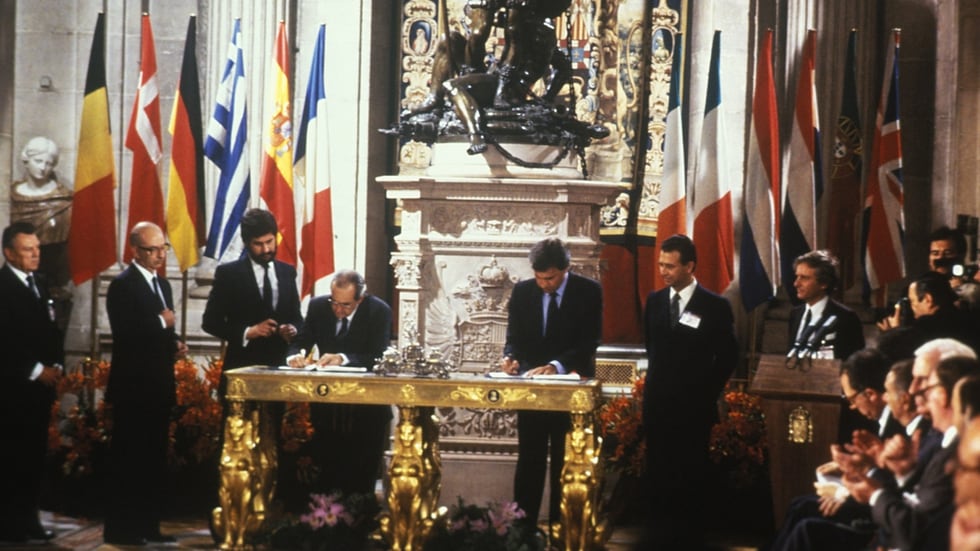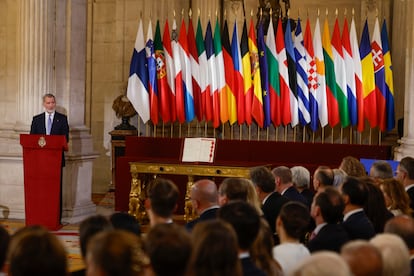40 years of the Adhesion Treaty: Spanish Europeanism resists cracks | Spain

In each EU country, Europe means something different: « For France, the hope of the Renaissance; for Germany, that of redemption; for Belgium, the glue of the national unity; for Spain, the return of democracy … ». That multiplicity of meanings, which defines the deep connoisseur of the union Luuk van Middelaar in his book Alarums and excursions (« Alarms and skames »), in Spain (and in Portugal) it was filled with images on June 12, 1985, When the Adhesion Treaty was signed to what was then called the European Economic Community. And it is there, in the back to the recent democracy, more than in the enormous amount of millions that have arrived from Brussels at this time to invest in infrastructure or in agricultural policy, where we must seek the vigor of Europeanism for four decades, according to all the sources consulted for the article, which do not forget that Spain is not an exception and has seen the hostility towards this feeling in recent times in recent times with the ultra. As a symptom.
Van Middelaar’s theory supports Joaquín Almunia, then Minister of Labor and years later European Commissioner: « Europe helped consolidate democracy in Spain. Without our belonging to the EU, our future would have been more uncertain. » The income occurred effectively on January 1, 1986. Looking at the past from the present, it may seem that the current result was the only one possible. But it was not like that on June 12, 40 years ago, a few days before an ultra attempt of assassination against King Juan Carlos and the then president of the Government, Felipe González, and that same day ETA tried to burst the firm with three attacks in which he murdered four people (to the colonel (the colonel Vicente Romero already your driver, Juan Garcíato the police artifier Esteban of the master and to the brigade José Millarengo de Bernedo).
The former vice president of the European Commission Margaritis Schinas, a deep connoisseur of Spain, sign out that vision from his Greek perspective and, above all, Bruslense, because he has a long career in the community capital: “The starting point of this is that Spain, as for my country, Greece, adhesion was a bet won of modernity. It was a historical thing. He entered the EU in 1981) had a fact as transcendental as adhesion, from a peripheral country to a central one. ”
Another of those people with a long career in European and multilateral institutions, former Minister Arancha González Laya, points out that the EU has served Spain to « discipline internally », to display reforms and policies that would otherwise have been more difficult to do.
« We have to frame Europe within Spanish politics. It is something historical that Ortega already said: ‘Spain as a problem, Europe as a solution.’ At the time the transition occurs, entering the European club gives the march and the quality seal. We must know this myth to understand the reservoir of Europeanism that Spain has, » analyzes Pablo Simón, professor of political science at the Carlos III University. Because if Spain stands out for something, it is still among the Member States, it is for its Europeanist public opinion. A 40DB survey. that this newspaper published just a month ago It placed in 74% the Spaniards declared themselves « totally Europeanist. »
The same can be said when compared to other countries. Not so much when there is talk of confidence in EU institutions, because the response of the Spaniards to this question is always much more detachment to any national, regional or European institution. And even so, it stands right in the average, 52% « tend to trust. » It looks more in supporting certain policies or affirmative answers to questions as if it is believed that « the EU needs more means to face the current world challenges. » According to the March Eurobarometer, 85% of Spaniards said that compared to 76% of the union set.
And that Europeanism also moves to political arena. At present, few EU countries have among their first two forces two political parties clearly decanted by Europeanism, especially among the largest states. Spain, yes: PSOE and PP, two formations whose European families have been key in the construction of the EU. As Ignacio Molina, researcher at the Elcano Institute, « if the latest elections are taken in the 12 greatest states of the Union, the first or second party is one of the nationalist right. » But Vox is not a phenomenon that can be ignored, nor was the first Podemos, in which, with deaf, there were also Eurosceptic features.
Spain, therefore, is no stranger to the context that Europe lives. Ultra -nationalist populism has not had its catalyst in antieuropeism as it was in the United Kingdom, even in matters that cause great division in the sand of the Union, such as migration. It was Catalan independence that shot him. But that does not mean that Euroscepticism nests there, like He also does it around the Ultra Alise Pérez activist. « When we have seen here that European policy is talk about in a pact for the budgets of an autonomous community, » says Simon, points out in reference to the agreements that the PP has reached with Vox to approve public accounts in the Valencian Community, in Murcia and in the Balearic Islands, which include high -caliber criticism, for example, to the European Green Pact.
« There are reasons to think that this has less route than in other countries, » says Simon, which, however, warns that these positions « are prefigured towards the future, this moves public opinion. » And that is where this researcher sees the possibility that Eurosceptic forces end up conditioning the position of a future government in Brussels, although it is commanded by a pro -European party. The reference to Vox and PP is evident.
Molina, on the other hand, sees an opportunity. But there is still a lot of improvement margin. « One country with almost 50 million inhabitants, with that European society, could be much more influential than Spain is now. Many times Poland, whose Europeanism hangs from one child, as we saw the other day, has more influence. And many times Poland, whose Europeanism hangs from one thread, as we saw the other day in its presidential elections, it influences more, » says the researcher of Elcano, taking one of the criticisms that he usually heard in the criticism. Brussels, that the Spaniards Boxean below their weight in the European arena. « Without a doubt there is an opportunity, because despite that 15% who votes to Vox, there is still a Europeanist majority. But we must stop thinking in Orteguian terms. » That is, Spain as a solution.
For that, former Vice President Schinas asks for a greater understanding between the PSOE and the PP. « The interest of populism, left and right, is less Europe. I do not say that they want to get Spain out of the EU or euro, but they have a vision of less caliber and less ambition. With a central understanding, much more could be done, » says this Greek, a member of the European Popular Party and also export of the community executive.
« Proeuropeism is demonstrated by walking, participating in consensus. It is not just responding very proeuropere and the next day be against greater integration. Spain has contributed a lot, even before entering the union, from exile, in the democratic opposition, » Almunia points out.







